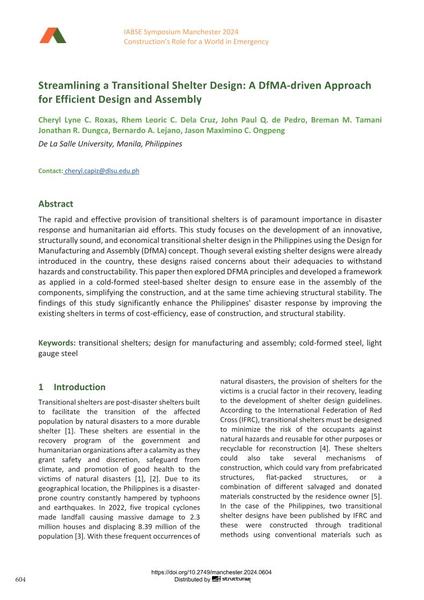Streamlining a Transitional Shelter Design: A DfMA-driven Approach for Efficient Design and Assembly

|
|
|||||||||||
Détails bibliographiques
| Auteur(s): |
Cheryl Lyne C. Roxas
(De La Salle University, Manila, Philippines)
Rhem Leoric C. Dela Cruz (De La Salle University, Manila, Philippines) John Paul Q. de Pedro (De La Salle University, Manila, Philippines) Breman M. Tamani (De La Salle University, Manila, Philippines) Jonathan R. Dungca (De La Salle University, Manila, Philippines) Bernardo A. Lejano (De La Salle University, Manila, Philippines) Jason Maximino C. Ongpeng (De La Salle University, Manila, Philippines) |
||||
|---|---|---|---|---|---|
| Médium: | papier de conférence | ||||
| Langue(s): | anglais | ||||
| Conférence: | IABSE Symposium: Construction’s Role for a World in Emergency, Manchester, United Kingdom, 10-14 April 2024 | ||||
| Publié dans: | IABSE Symposium Manchester 2024 | ||||
|
|||||
| Page(s): | 604-612 | ||||
| Nombre total de pages (du PDF): | 9 | ||||
| DOI: | 10.2749/manchester.2024.0604 | ||||
| Abstrait: |
The rapid and effective provision of transitional shelters is of paramount importance in disaster response and humanitarian aid efforts. This study focuses on the development of an innovative, structurally sound, and economical transitional shelter design in the Philippines using the Design for Manufacturing and Assembly (DfMA) concept. Though several existing shelter designs were already introduced in the country, these designs raised concerns about their adequacies to withstand hazards and constructability. This paper then explored DFMA principles and developed a framework as applied in a cold-formed steel-based shelter design to ensure ease in the assembly of the components, simplifying the construction, and at the same time achieving structural stability. The findings of this study significantly enhance the Philippines' disaster response by improving the existing shelters in terms of cost-efficiency, ease of construction, and structural stability. |
||||
